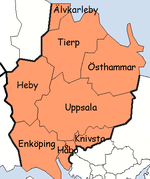Fjuckby
History
Prior to the 1930s, the village was known as Fjukeby. In the 1930s, the spelling of the name of this small village was changed to Fjuckby. With the rise of international travel by Anglophones, and the rise of global communications, English-speaking tourists have traveled to Fjuckby out of amusement at the name in order to ridicule it. Inhabitants of Fjuckby endured years of ridicule over the name, which is not only similar to the English word "fuck", but also to the Swedish juck ("pelvic thrust").
Over time, some residents grew weary from constantly having to take a tiresome defensive stance, and suffered from constant teasing. In addition, the name Fjuckby made it difficult to sell property or run a successful business.
In December 2006 15 of the inhabitants of Fjuckby applied to change the name of their village. The request was sent to the Swedish government surveyors' office, and requested that the office grant permission for the name to be changed back to Fjukeby. The request complained of suffering from an epidemic of "weariness, embarrassment and conditioned shame." In particular, the place name 'Fjuckby' arouses ridicule, teasing and hilarity in the general public and spontaneously and repeatedly leads to associations concerning certain carnal activities between people and between animals. The change was not allowed as only 15 of 65 residents were in favour of the change.
Location
Fjuckby is located north of Uppsala in central Uppsala County. Uppsala County is located on Sweden's east coast, between the Gulf of Bothnia in the north and Lake Mälaren in the south. (Coordinates: 59°58′N 17°36′E / 59.967°N 17.600°E.)
Runestone

One of the runestones Fjuckby contains is the Greece Runestone U 1016, which commemorates in its inscription that the location of the death of a person was at home. A recently discovered runic section inside a main runic band on the runestone contains an inscription that commemorates a son who died in Greece. In particular, the stone reads:
Captain Liut erected this stone in memory of his sons. One was called Aki, who was lost overseas. <?) captained a merchant ship. He reached Greek harbours. At home he died.
In a study by Fred Wulf, Wulf proposes that the added message emphasizes that the sponsor's other son Hafnir had died at home.

See also
References
- ^ O'Mahony, Paul. (December 14, 2006) The Local. Residents of Fjuckby demand new name.
- ^ Daily Record (Scotland) (December 16, 2006) Bad spell for village. Section: News, Page 5
- ^ Olbermann, Keith. (December 14, 2006) NBC News News. 'Countdown with Keith Olbermann' for Dec. 14. Part 1. (reporting, " But now, here are COUNTDOWN‘s top three newsmakers of this day. ... Number two, residents of a small historic town in Sweden who have to get government permission to change the name of the place after years of silent suffering -- Fjuckby, F-J-U-C-K-B-Y, Fjuckby. They say globalization has made this necessary. Too many English-speaking visitors coming by Fjuckby and giggling, or worse.")
- ^ Gold Coast Bulletin (December 16, 2006) Call for F-Word Change; Village voices opposition to name that's no joke. Section: B - Main; page 103.
- ^ The Independent (December 15, 2006) Fjuckby villagers tire of ridicule. Section: EUROPE; Page 30. (writing, "Residents of a Swedish hamlet complain that they are suffering from an epidemic of "weariness, embarrassment and conditioned shame" and need official help to escape being constantly "forced to take a tiresome defensive stance". The inhabitants of Fjuckby say that the global spread of English means that they suffer constant teasing and low self-esteem. Now they want permission to change the village name -- to Fjukeby. After enduring years of ridicule the inhabitants of the Swedish village of Fjuckby have handed in an application to Swedish authorities to have the hamlet's name changed to Fjukeby.")
- ^ Reuters (December 14, 2006) Tired of ridicule, Fjuckby seeks name change.
- ^ Wicker, Nancy L. (July 1, 2000). Society for the Advancement of Scandinavian Study. Blandade Runstudier 2. Archived 2007-10-07 at the Wayback Machine Volume 72; Issue 2, Page 232.
- ^ Ian, Raymond. (1995) Chronicles of the Vikings: records, memorials, and myths. Published by University of Toronto Press. Page 84. ISBN 0-8020-7165-1